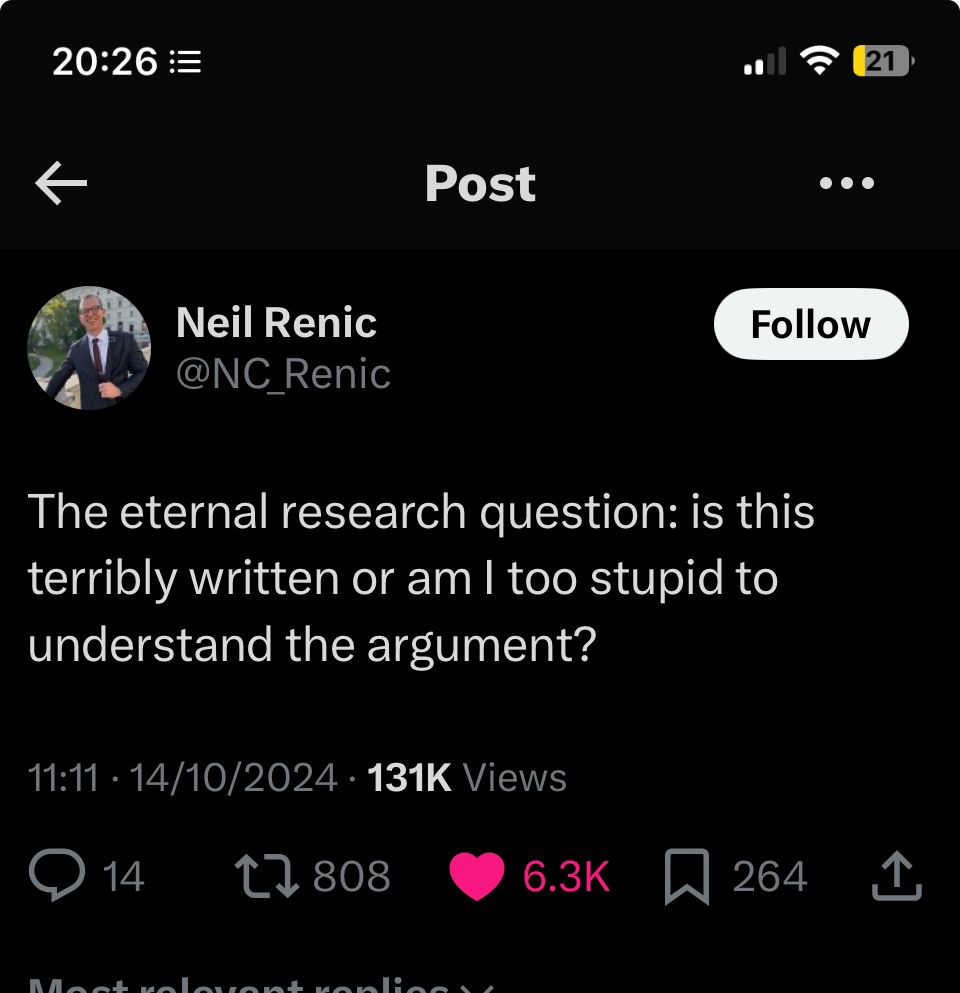this post was submitted on 16 Oct 2024
1037 points (99.3% liked)
Science Memes
11516 readers
2712 users here now
Welcome to c/science_memes @ Mander.xyz!
A place for majestic STEMLORD peacocking, as well as memes about the realities of working in a lab.

Rules
- Don't throw mud. Behave like an intellectual and remember the human.
- Keep it rooted (on topic).
- No spam.
- Infographics welcome, get schooled.
This is a science community. We use the Dawkins definition of meme.
Research Committee
Other Mander Communities
Science and Research
Biology and Life Sciences
- [email protected]
- [email protected]
- [email protected]
- [email protected]
- [email protected]
- [email protected]
- [email protected]
- [email protected]
- [email protected]
- [email protected]
- [email protected]
- [email protected]
- [email protected]
- [email protected]
- [email protected]
- [email protected]
- [email protected]
- [email protected]
- [email protected]
- [email protected]
- [email protected]
- [email protected]
- [email protected]
- [email protected]
- !reptiles and [email protected]
Physical Sciences
- [email protected]
- [email protected]
- [email protected]
- [email protected]
- [email protected]
- [email protected]
- [email protected]
- [email protected]
- [email protected]
Humanities and Social Sciences
Practical and Applied Sciences
- !exercise-and [email protected]
- [email protected]
- !self [email protected]
- [email protected]
- [email protected]
- [email protected]
Memes
Miscellaneous
founded 2 years ago
MODERATORS
you are viewing a single comment's thread
view the rest of the comments
view the rest of the comments

For sure, you occasionally run into some obscurantism, and that’s problematic. In my field, bad writing is usually just from people not writing in their native language.
But look, you have to acknowledge, some stuff is just hard. There is often just an unavoidable barrier to entry. I think behind a lot of this sentiment is the assumption that academics are just twiddling their thumbs for 10 years through undergrad and grad school, and anyone should be able to walk into the kind of conversations they’re having after all that. I mean, most of the time, not really. We go a learn a bunch of stuff and our colleagues learn similar things, and we then assume a common framework and some common knowledge, both of which are generally not widely available to the general public.
Where I got my PhD, we all had to write a lay summary of the thesis. It’s good they made us do it, but we always used to laugh about it. There’s usually too much assumed background for a useful lay summary to even be possible. You just end up with a very vague facsimile of a summary of the type of thing you’re doing.
It might depend on the field. I have no doubt that the average paper in my field is unavoidably going to be pretty inscrutable to laypeople, and that’s mostly fine. Maybe in some other fields it’s more avoidable, somehow, but again I’d have to imagine that if people are spending their time productively in the academic system they’ll have picked up a bunch of background mostly unavailable to most people.
As a PS, there’s also something weird to me in general about people thinking that they know how to do other peoples’ jobs better than them. See it all the time with retail, planning, media etc, people can’t seem to fathom that things may be the way they are for good reasons that they aren’t privy to.
I think there's still a difference between describing a concept in a way laypeople would understand and describing it using plain English. The latter is what I consider good scientific writing.
Sure there is a difference. The comment I was replying to was talking about making text accessible to outsiders though. Even just talking about plain English is a bit problematic though - the problem is that a whole bunch of technical disciplines are jargon heavy and not easily amenable to straightforward plain English. If you’re talking about things like general flowery prose, it essentially doesn’t exist in the hard sciences - at least that I’ve seen.
Maybe the humanities are different, but I sometimes wonder if the humanities are under more scrutiny because they deal with topics laypeople reckon they have a good intuitive grasp on. I actually had an interesting time at a party recently watching a sociology grad student working on the Scottish criminal justice system politely nod as a young English woman lectured her on the topic purely based on whatever half digested stereotypes she’d picked up in her 30-odd years.